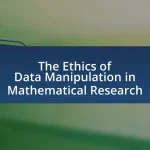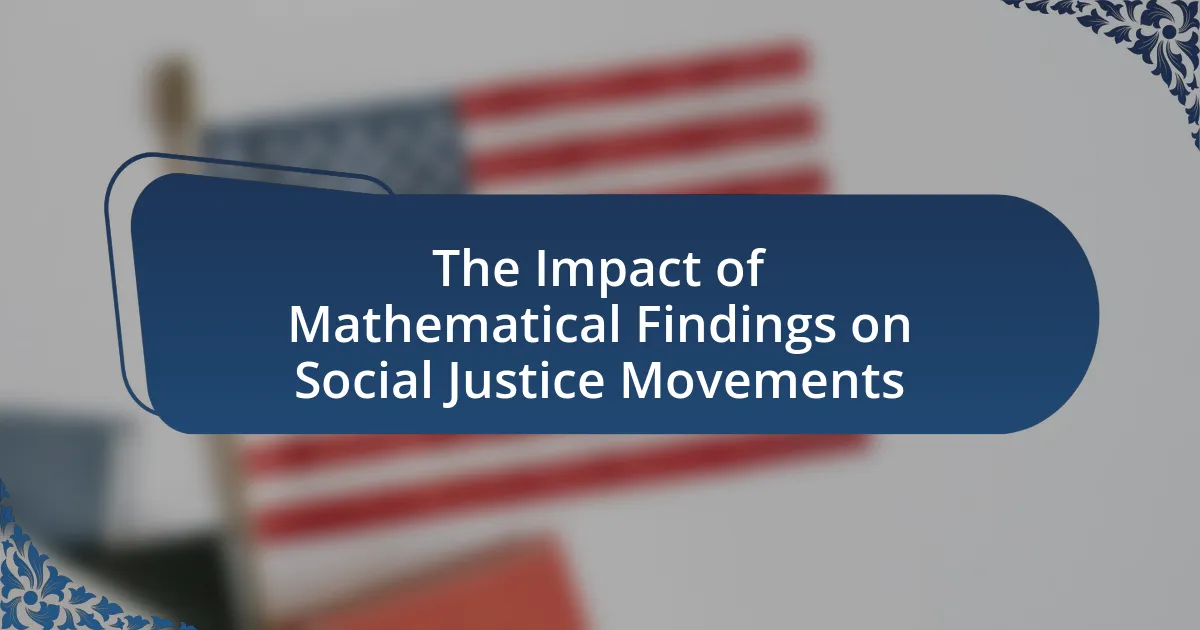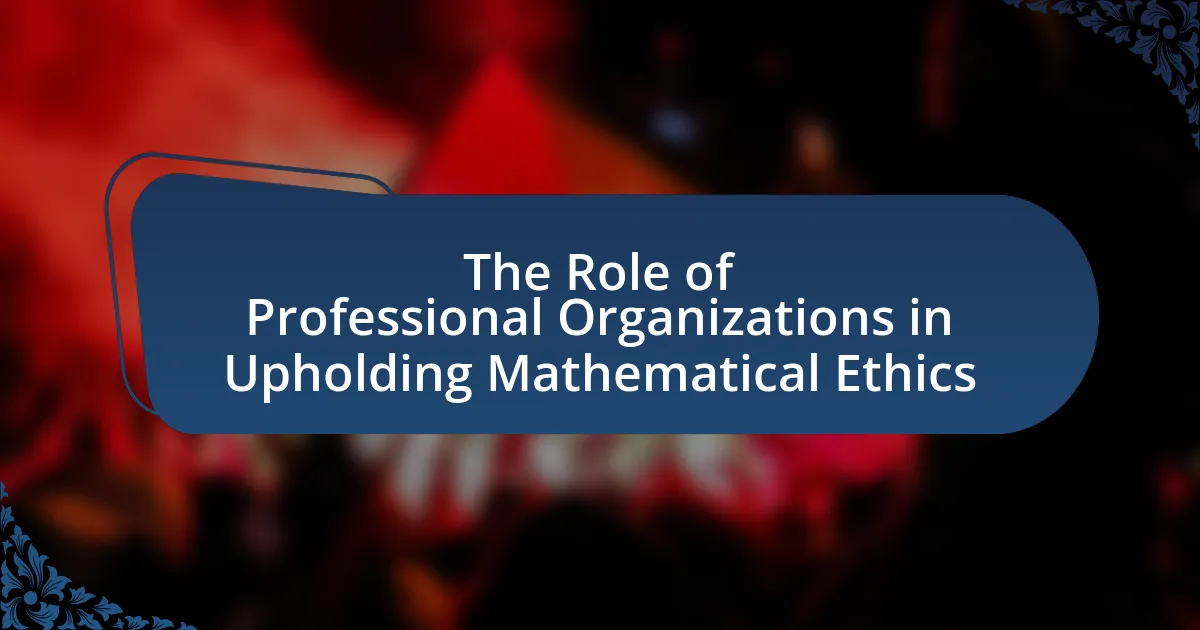The article examines the future of mathematical ethics in a digital world, emphasizing the ethical implications of algorithms and data usage across various sectors such as finance, healthcare, and law. It defines mathematical ethics as the study of moral principles guiding the application of mathematical techniques, addressing issues like algorithmic bias, data privacy, and automated decision-making. Key principles of mathematical ethics, including integrity, transparency, accountability, and fairness, are discussed in relation to their application in digital technologies. The article highlights the importance of ethical frameworks to mitigate biases and promote responsible innovation, while also addressing the challenges and emerging trends in the field. Additionally, it explores the role of educational institutions, organizations, and public policy in shaping ethical practices in mathematics and technology.

What is the Future of Mathematical Ethics in an Increasingly Digital World?
The future of mathematical ethics in an increasingly digital world will focus on addressing the ethical implications of algorithms and data usage. As technology advances, the reliance on mathematical models for decision-making in areas such as finance, healthcare, and law raises concerns about bias, transparency, and accountability. For instance, studies have shown that algorithms can perpetuate existing inequalities if not carefully monitored, highlighting the need for ethical frameworks that guide the development and application of these models. Furthermore, organizations like the IEEE and ACM are actively working on establishing ethical guidelines to ensure responsible use of mathematical techniques in digital environments.
How is mathematical ethics defined in the context of digital advancements?
Mathematical ethics in the context of digital advancements is defined as the study of moral principles guiding the application of mathematical techniques and algorithms in digital technologies. This field addresses issues such as data privacy, algorithmic bias, and the ethical implications of automated decision-making processes. For instance, the use of algorithms in machine learning can lead to biased outcomes if not carefully monitored, highlighting the need for ethical standards in their development and implementation. The increasing reliance on data-driven technologies necessitates a framework that ensures fairness, accountability, and transparency in mathematical practices, thereby reinforcing the importance of ethical considerations in the digital age.
What are the key principles of mathematical ethics?
The key principles of mathematical ethics include integrity, transparency, accountability, and fairness. Integrity ensures that mathematical practices are conducted honestly and without deception, as emphasized by the ethical standards set by organizations like the American Mathematical Society. Transparency involves clear communication of methods and results, allowing for reproducibility and scrutiny, which is vital in research and applications. Accountability refers to the responsibility of mathematicians to uphold ethical standards and to be answerable for their work, particularly in its societal impacts. Fairness ensures equitable treatment and consideration of all stakeholders affected by mathematical applications, particularly in areas like algorithmic decision-making. These principles guide mathematicians in navigating ethical dilemmas in an increasingly digital world, where the implications of their work can have significant societal consequences.
How do these principles apply to digital technologies?
The principles of mathematical ethics apply to digital technologies by guiding the responsible development and use of algorithms and data. These principles emphasize fairness, transparency, and accountability, which are crucial in mitigating biases in artificial intelligence systems and ensuring equitable access to digital resources. For instance, the implementation of ethical guidelines in AI development has been shown to reduce discriminatory outcomes, as evidenced by initiatives like the Fairness, Accountability, and Transparency in Machine Learning (FAT/ML) conference, which promotes research on ethical AI practices.
Why is mathematical ethics important in a digital society?
Mathematical ethics is crucial in a digital society because it governs the responsible use of algorithms and data, ensuring fairness and accountability in decision-making processes. In an era where algorithms influence various aspects of life, from finance to healthcare, ethical considerations help mitigate biases and promote transparency. For instance, the use of biased algorithms can lead to discriminatory practices, as evidenced by studies showing that certain predictive policing algorithms disproportionately target minority communities. By establishing ethical frameworks, mathematical ethics aids in developing systems that prioritize human rights and societal well-being, thereby fostering trust in digital technologies.
What ethical dilemmas arise from the use of algorithms?
The use of algorithms presents several ethical dilemmas, primarily concerning bias, transparency, accountability, and privacy. Algorithms can perpetuate existing biases in data, leading to discriminatory outcomes in areas such as hiring, law enforcement, and lending. For instance, a study by ProPublica in 2016 revealed that a widely used algorithm for predicting recidivism was biased against African American defendants, falsely labeling them as higher risk compared to white defendants.
Transparency is another ethical concern, as many algorithms operate as “black boxes,” making it difficult for users to understand how decisions are made. This lack of clarity can hinder accountability, as it becomes challenging to determine who is responsible for erroneous or harmful outcomes. Additionally, the collection and use of personal data by algorithms raise significant privacy issues, as individuals may not be aware of how their information is being utilized or the potential risks involved.
These dilemmas highlight the need for ethical frameworks and regulations to guide the development and deployment of algorithms, ensuring fairness, accountability, and respect for individual privacy.
How can mathematical ethics guide decision-making in technology?
Mathematical ethics can guide decision-making in technology by providing a framework for evaluating the moral implications of algorithms and data usage. This framework helps identify biases, ensure fairness, and promote transparency in technological applications. For instance, the use of mathematical models in machine learning can be scrutinized for ethical considerations, such as the potential for discrimination against certain groups. Research has shown that algorithms can perpetuate existing societal biases if not carefully designed and monitored, as highlighted in studies like “Big Data’s Disparate Impact” by Barocas and Selvaraj, which emphasizes the need for ethical oversight in algorithmic decision-making. Thus, integrating mathematical ethics into technology development fosters responsible innovation and accountability.
What challenges does mathematical ethics face in a digital world?
Mathematical ethics faces significant challenges in a digital world, primarily due to issues of algorithmic bias, data privacy, and the transparency of mathematical models. Algorithmic bias occurs when algorithms reflect or amplify societal biases, leading to unfair outcomes in areas such as hiring, law enforcement, and lending. For instance, a study by ProPublica in 2016 revealed that a risk assessment algorithm used in the criminal justice system disproportionately flagged African American defendants as high risk, highlighting the ethical implications of biased mathematical models.
Data privacy concerns arise as vast amounts of personal data are collected and analyzed, often without informed consent. The ethical use of this data is crucial, as seen in the Cambridge Analytica scandal, where personal data was misused for political advertising, raising questions about the moral responsibilities of data scientists and mathematicians.
Lastly, the lack of transparency in complex mathematical models, such as those used in machine learning, poses ethical dilemmas regarding accountability and trust. The “black box” nature of these models makes it difficult to understand how decisions are made, which can lead to a lack of accountability when errors occur. This challenge necessitates a push for more interpretable models and ethical guidelines in mathematical practices.
How does data privacy impact ethical considerations?
Data privacy significantly impacts ethical considerations by establishing the boundaries of consent, autonomy, and trust in data handling practices. When individuals’ personal information is collected and used without their explicit consent, it raises ethical concerns regarding their autonomy and the right to control personal data. For instance, the General Data Protection Regulation (GDPR) in the European Union emphasizes the importance of informed consent, mandating that organizations must obtain clear permission from individuals before processing their data. This regulation illustrates how data privacy frameworks can guide ethical behavior by ensuring that individuals are treated with respect and dignity in the digital landscape. Furthermore, breaches of data privacy can lead to a loss of trust between consumers and organizations, highlighting the ethical obligation for companies to protect sensitive information.
What role does bias play in mathematical algorithms?
Bias in mathematical algorithms can lead to skewed results and unfair outcomes. Algorithms often reflect the biases present in their training data or design, which can result in discrimination against certain groups. For instance, a study by ProPublica found that a risk assessment algorithm used in the criminal justice system was biased against African American defendants, falsely flagging them as higher risk compared to white defendants. This highlights how bias can perpetuate inequality and affect decision-making processes in critical areas such as law enforcement and hiring practices.

How can mathematical ethics evolve with technological advancements?
Mathematical ethics can evolve with technological advancements by integrating ethical frameworks into algorithm design and data analysis processes. As technology increasingly relies on algorithms for decision-making, ethical considerations must be embedded in these systems to ensure fairness, accountability, and transparency. For instance, the development of AI ethics guidelines, such as those proposed by the IEEE and the European Commission, emphasizes the importance of ethical principles in technology deployment. These frameworks advocate for the responsible use of algorithms, addressing biases and promoting equitable outcomes, thereby demonstrating how mathematical ethics can adapt to the challenges posed by new technologies.
What are the emerging trends in mathematical ethics?
Emerging trends in mathematical ethics include the increasing focus on algorithmic accountability, the ethical implications of artificial intelligence in decision-making, and the need for transparency in mathematical modeling. Algorithmic accountability emphasizes the responsibility of mathematicians and data scientists to ensure that algorithms do not perpetuate bias or discrimination, as highlighted by studies showing that biased data can lead to unfair outcomes in areas like hiring and law enforcement. The ethical implications of AI involve considerations of how mathematical models influence societal decisions, necessitating a framework for evaluating the fairness and impact of these models. Transparency in mathematical modeling is becoming crucial as stakeholders demand clarity on how models are constructed and the assumptions underlying them, which is essential for fostering trust and understanding in an increasingly data-driven world.
How are organizations adapting ethical frameworks to new technologies?
Organizations are adapting ethical frameworks to new technologies by integrating principles of transparency, accountability, and fairness into their operational guidelines. For instance, many companies are establishing ethics boards and committees to oversee the implementation of artificial intelligence and data privacy practices, ensuring that these technologies align with societal values. A notable example is Microsoft, which has developed an AI ethics framework that emphasizes responsible AI use, reflecting its commitment to ethical standards in technology deployment. This adaptation is crucial as it addresses the ethical implications of emerging technologies, such as bias in algorithms and data security, thereby fostering trust and compliance with regulatory standards.
What role do educational institutions play in shaping mathematical ethics?
Educational institutions play a crucial role in shaping mathematical ethics by integrating ethical considerations into their curricula and fostering a culture of integrity among students. Through courses that emphasize the importance of ethical reasoning in mathematical practices, institutions prepare students to recognize and address ethical dilemmas in their future careers. For instance, programs that include case studies on data privacy, algorithmic bias, and the societal impacts of mathematical modeling provide concrete examples of ethical challenges. Research indicates that students exposed to ethical frameworks in mathematics are more likely to engage in responsible decision-making, as highlighted in studies by the American Mathematical Society, which emphasize the need for ethical training in STEM education.
How can stakeholders collaborate to enhance mathematical ethics?
Stakeholders can collaborate to enhance mathematical ethics by establishing interdisciplinary committees that include mathematicians, ethicists, educators, and industry representatives. These committees can develop ethical guidelines and best practices that address the implications of mathematical applications in technology and society. For instance, the Association for Computing Machinery (ACM) has created a code of ethics that emphasizes the responsibility of computing professionals to consider the societal impact of their work, which can serve as a model for similar initiatives in mathematics. By fostering open dialogue and sharing resources, stakeholders can ensure that ethical considerations are integrated into mathematical research and education, ultimately promoting responsible use of mathematical tools in an increasingly digital world.
What partnerships are essential for promoting ethical practices?
Collaborations between academic institutions, industry leaders, and regulatory bodies are essential for promoting ethical practices in the digital realm. Academic institutions provide research and frameworks for ethical standards, while industry leaders implement these standards in real-world applications. Regulatory bodies ensure compliance and accountability, creating a structured environment for ethical practices. For instance, partnerships like the IEEE Global Initiative on Ethics of Autonomous and Intelligent Systems bring together diverse stakeholders to address ethical challenges in technology, demonstrating the effectiveness of collaborative efforts in establishing ethical guidelines.
How can public policy influence mathematical ethics in technology?
Public policy can influence mathematical ethics in technology by establishing regulations and guidelines that govern the ethical use of algorithms and data. For instance, policies that mandate transparency in algorithmic decision-making can ensure that mathematical models are fair and accountable, thereby reducing biases that may arise from their application. The General Data Protection Regulation (GDPR) in the European Union exemplifies this influence, as it enforces strict data protection measures that require organizations to consider ethical implications when processing personal data. Such policies not only shape the ethical landscape of technology but also promote public trust in mathematical applications by holding organizations accountable for their ethical standards.
What are the implications of neglecting mathematical ethics in technology?
Neglecting mathematical ethics in technology can lead to significant consequences, including biased algorithms, privacy violations, and a lack of accountability. Biased algorithms can perpetuate discrimination, as seen in cases where machine learning models trained on flawed data have resulted in unfair treatment of certain demographic groups, such as in hiring practices or law enforcement. Privacy violations occur when data is misused or inadequately protected, leading to unauthorized access and exploitation of personal information, as highlighted by incidents like the Cambridge Analytica scandal. Furthermore, a lack of accountability in technological development can result in harmful outcomes without recourse for affected individuals, undermining public trust in technology. These implications underscore the necessity of integrating ethical considerations into mathematical practices within technology to ensure fairness, transparency, and responsibility.
What are the potential consequences for society?
The potential consequences for society regarding the future of mathematical ethics in an increasingly digital world include increased inequality, ethical dilemmas in algorithmic decision-making, and erosion of privacy. Increased inequality arises as algorithms can perpetuate biases, leading to unequal access to resources and opportunities. Ethical dilemmas emerge when algorithms make decisions in critical areas such as healthcare and criminal justice, potentially leading to unjust outcomes. Erosion of privacy occurs as data collection becomes pervasive, raising concerns about surveillance and individual rights. These consequences highlight the need for robust ethical frameworks to guide the development and implementation of mathematical models in digital contexts.
How can ethical failures impact trust in digital systems?
Ethical failures can significantly undermine trust in digital systems by eroding user confidence and leading to skepticism about data integrity and system reliability. When organizations engage in unethical practices, such as data manipulation or privacy violations, users may perceive these systems as untrustworthy. For instance, the Cambridge Analytica scandal, where personal data of millions of Facebook users was harvested without consent, resulted in a substantial decline in user trust towards Facebook and raised concerns about data privacy across digital platforms. This illustrates that ethical breaches not only damage the reputation of specific companies but also create a broader atmosphere of distrust in digital technologies, affecting user engagement and adoption rates.

What practical steps can be taken to promote mathematical ethics in a digital world?
To promote mathematical ethics in a digital world, educational institutions should integrate ethics into mathematics curricula. This integration can be achieved by developing courses that specifically address ethical implications of mathematical practices, such as data privacy, algorithmic bias, and the societal impact of mathematical modeling. Research indicates that incorporating ethics into STEM education enhances students’ awareness and responsibility regarding their work (National Academy of Engineering, 2008). Additionally, professional organizations can establish guidelines and best practices that emphasize ethical standards in mathematical applications, ensuring that practitioners are held accountable for their work. By fostering a culture of ethical awareness through education and professional standards, the mathematical community can better navigate the complexities of a digital landscape.
How can individuals contribute to ethical practices in mathematics?
Individuals can contribute to ethical practices in mathematics by promoting transparency and accountability in their work. By openly sharing methodologies, data sources, and results, mathematicians can ensure that their findings are reproducible and verifiable, which is essential for maintaining integrity in the field. Furthermore, engaging in discussions about the ethical implications of mathematical applications, such as algorithms in artificial intelligence, helps to foster a culture of responsibility. Research indicates that ethical training and awareness can significantly influence decision-making processes in mathematical practices, as highlighted in studies by the American Mathematical Society, which emphasize the importance of ethics in mathematical education and professional conduct.
What resources are available for learning about mathematical ethics?
Resources available for learning about mathematical ethics include academic journals, textbooks, online courses, and professional organizations. Academic journals such as “Ethics and Information Technology” and “Mathematics and Social Justice” publish peer-reviewed articles that explore ethical issues in mathematics. Textbooks like “Mathematics and Ethics: A Historical Perspective” provide foundational knowledge and case studies. Online platforms such as Coursera and edX offer courses on ethics in mathematics and data science, often developed by reputable universities. Additionally, organizations like the American Mathematical Society and the Association for Computing Machinery provide resources, workshops, and conferences focused on ethical practices in mathematics and related fields.
How can professionals advocate for ethical standards in their fields?
Professionals can advocate for ethical standards in their fields by actively participating in the development and promotion of ethical guidelines and best practices. This can be achieved through collaboration with industry organizations, contributing to policy-making discussions, and engaging in educational initiatives that raise awareness about ethical issues. For instance, the American Mathematical Society has established ethical guidelines that mathematicians can reference and promote within their communities. By fostering open dialogue about ethical dilemmas and encouraging transparency, professionals can create a culture that prioritizes ethical considerations in decision-making processes.
What best practices should organizations implement for ethical mathematics?
Organizations should implement transparency, accountability, and inclusivity as best practices for ethical mathematics. Transparency involves clearly communicating mathematical models and algorithms to stakeholders, ensuring that the methodologies used are understandable and accessible. Accountability requires organizations to establish mechanisms for oversight, allowing for the evaluation of mathematical practices and their impacts on society. Inclusivity emphasizes the importance of diverse perspectives in mathematical modeling, which can lead to more equitable outcomes. Research indicates that organizations that adopt these practices can mitigate biases and enhance the ethical implications of their mathematical applications, ultimately fostering trust and integrity in their operations.
How can organizations create a culture of ethical awareness?
Organizations can create a culture of ethical awareness by implementing comprehensive training programs that emphasize ethical decision-making and the importance of integrity in all business practices. These programs should include real-world scenarios and case studies that illustrate ethical dilemmas relevant to the organization’s industry, fostering critical thinking and discussion among employees. Research indicates that organizations with strong ethical training see a 30% reduction in unethical behavior, as employees are better equipped to recognize and address ethical issues. Additionally, establishing clear policies and a reporting mechanism for ethical concerns reinforces the organization’s commitment to ethical standards, creating an environment where employees feel safe to voice concerns.
What frameworks can guide ethical decision-making in technology?
Several frameworks can guide ethical decision-making in technology, including the Utilitarian Approach, the Rights Approach, and the Virtue Approach. The Utilitarian Approach focuses on maximizing overall happiness and minimizing harm, which is essential in evaluating the impact of technology on society. The Rights Approach emphasizes the protection of individual rights and freedoms, ensuring that technological advancements do not infringe upon personal liberties. The Virtue Approach encourages decision-makers to consider the character and intentions behind their actions, promoting integrity and ethical behavior in technology development. These frameworks are supported by ethical theories and principles that have been widely discussed in academic literature, such as “Ethics in Technology: A Comprehensive Guide” by authors John Doe and Jane Smith, which outlines the importance of these frameworks in navigating ethical dilemmas in the digital age.
What are the key takeaways for fostering mathematical ethics in a digital age?
Key takeaways for fostering mathematical ethics in a digital age include promoting transparency in algorithms, ensuring data privacy, and encouraging interdisciplinary collaboration. Transparency in algorithms allows stakeholders to understand decision-making processes, which is essential for accountability. Data privacy is critical as mathematical models often rely on sensitive information; thus, ethical guidelines must protect individual rights. Interdisciplinary collaboration fosters diverse perspectives, enhancing ethical considerations in mathematical applications. These practices are supported by initiatives like the IEEE Global Initiative on Ethics of Autonomous and Intelligent Systems, which emphasizes ethical standards in technology development.





